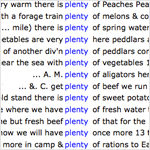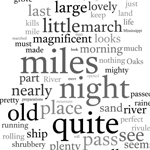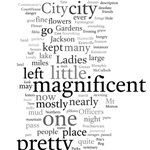The Place
Links to the evidence referenced in this analysis appear in the sidebar to the left and within the analysis text. Simply click on a link (e.g. Figure iii) and a screen will pop up to display the visualization.
Alcander's response to the Southern environment is much more positive than his reaction to Southerners themselves. His view of the Southern wilderness and landscape reflects an understanding of the place as beautifully wild and poorly tamed. As a soldier from northern Illinois, he seems particularly attentive to the mountainous and marshy terrain he encounters during his travels through Missouri, Arkansas, and Louisiana. His journal is scattered with adulations over the scenery, and the spoils of the fertile landscape often satisfy his stomach. For a soldier subsisting on army rations, the Southern environment is a lush and fertile land of plenty. He often remarks on the abundance of fruits and vegetables, including, in particular, blueberries and corn. (See Figure iv and Figure C.) He describes the wilderness—with its "magnificent Prairies studded with small Groves" and "beautiful valley with splendid springs[,] a beautiful creek[,] large Oaks & Pines & various trees & shrubbery"—using expressive adjectives like beautiful, splendid, and magnificent. (See Figure B.) As a third-generation farmer, Alcander often looks at the land through a farmer's eye. "This is the best part of Mo. we have ever been through[.] it is generaly well cultivated & almost every farm has a vineyard & some of them beautiful ones." He also pays careful attention to the abilities (or lack thereof) of Southern agriculturalists. "the people are very ignorant in this part of Missouri[.] they have beautiful farms but they are so very indolent that they look very bad."
The southernmost reaches of Texas are especially exotic to the Illinois farmer. His journal entries during his time in Texas are full of marvels. During his travels through the Gulf, he experienced "a perfect gale" and describes it in excited detail:
our rudder chain gave way & for an hour or so the old ship rolled as though it was a cradle with a cross child rocking it[.] still it struggled on against the mighty waves as if concious of its precious burden & at last by persevering efforts of our Noble crew[,] the releiving takles were rigged & manned by part sailors & part from this Reg. . . . a storm at sea is a sight of fearful granduer to see[.] the great waves come rolling up chasing each other as though eager to seize their prey & then to see them break together or against the ship & roll back to meet the next[.] none but those who know by experience can imagine the splendor of those Grand old waves with their foam covered crest & then to see a ship go rolling over them half upsetting & then righting[.] it almost seems as though they were things of life instead of old hulks of wood & Iron[,] but thus it is & we are here in one of these same old hulks with very little to keep her before the wind & nothing to keep her any other way & no knowing when this wind will die away[.] still God is our Guide & if it is in accordance with his Holy will we shall land safley.
While exploring an island off the coast of Texas, Alcander and a fellow soldier play tourist, collecting seashells, and exploring the environment. "land on the Island[.] it is nothing but a sand hill[.] go hunting shell[.] some beautiful ones are found by myself and Corporal Dukitte[.] also one oyster."
The use of steam transportation in the Western Theater of the war was an asset to the Civil War traveler. Moving via railroad and steamship, in addition to marching on foot, permitted Alcander to become familiar with over a thousand miles of the Southern landscape. While foot travel allowed him the most intimate access to his destinations, traversing the Mississippi River and its tributaries by steamer provided a breathtaking and memorable view. "it is a beautiful day & it is magnificent scenery around us as we pass up the River which is a deep narrow stream."
Alcander often mourns the destruction of real property as he passes through greatly contested areas. When his regiment passed through Fayetteville, Arkansas in late 1862, he was shocked at its condition. "this is a beautiful town[,] or has been[.] now it is sadly desolate. Ben McCulloch destroyed its most important parts[,] mills[,] Seminary[,] CourtHouse[,] &.c.[,] which were all splendid buildings[.] there is one seminary left." Most of the devastation Alcander notes was carried out by the Rebel forces. He finds it curious that the Southern occupants of these destroyed settlements would continue to support the Rebel cause after its armies laid waste to their towns and cities. "the town has been a beautiful one[,] but it has been ransacked by the Reb's[.] & strange as it may seem[,] the people are rebel sympathisers still[.] the Officers of the Rebel Army have allowed their men to pillage this town[.] they have even taken the dresses[,] bedquilts & pillows from the Ladies and in some instances[,] they have taken the victuals from the houses so that the people have to go hungry." He does refer to one instance of Northern destruction, but he places the blame on the "miserable" Missourians. "nearly all the Houses on this road[,] Keatsville & Cassville included[,] have been burned to the ground by our (miserable) Missouri troops."
He applauds the civilizing affect of Northern occupation of Southern cities like Memphis and New Orleans. (See Figure E.) After landing briefly in Memphis while traversing the Mississippi, Alcander notes, "at Memphis two hours[.] this is a beautiful city & is kept in good order[.] I should judge by appearances that the Comdg. Gen (Hurlbut) was doing his duty well[.]" When he visits New Orleans during the summer of 1863, he is enchanted by the city's scenic qualities. "this has been a lovely day[.] I have been to the city & well may New Orleans be called the queen City of the south[.] it is kept so clean[.] it has no such magnificent buildings as some Northern Cities has[,] still they look very pretty[.] the most magnificent structure is in the city is the Monument of Jackson[.] his motto[,] "The Union must & shall be preserved" is Engraved in large letters under him, & then such a beautiful yard[.] so many pretty flowers & so many diferent kinds of shrubbery." While he appears to have enjoyed his time there, Alcander cannot resist comparing New Orleans to the industrious Northern cities he has known, and equates the city with the splendor and romanticism often associated with the chivalric South.
Not all of the journal's reflections of the environment were as picturesque as traveling along the Mississippi River or marveling at the pretty cleanliness of New Orleans. Some observations held more grim connotations. "camp on the very ground where we made our last charge at the Battle of Pearidge[,] march 8th/62. the effects of the battle are to be seen on every side[.] here a tree splintered by a shell[,] in another place a score of bullets are embedded in the trunk of some giant oak." The war had seared its violent footprint onto the Southern landscape.




